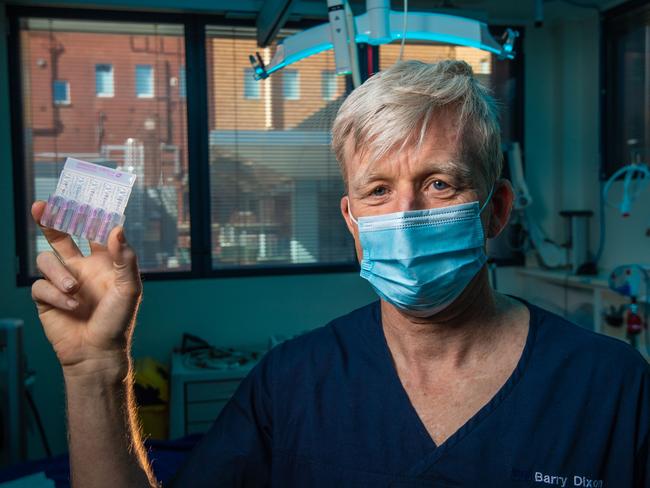Melbourne researchers looking for volunteers to trial a nasal spray aimed at preventing Covid
A nasal spray aimed at preventing Covid infections in cancer patients has achieved tremendous results — but now researchers need your help.
Coronavirus
Don't miss out on the headlines from Coronavirus. Followed categories will be added to My News.
All cancer patients so far treated with a Melbourne-developed nasal spray hoped to prevent Covid have avoided infection during several large waves of the pandemic this year.
However, Peter MacCallum Cancer Centre and the Royal Melbourne Hospital researchers are now desperate for more volunteers to come forward so they can know whether or not they have uncovered a way to stop Covid for vulnerable patients and the wider community.
So far, 175 people have taken part in the C-SMART trial, receiving daily doses of a nasal spray containing cancer drug interferon, hoped to prevent Covid and other viruses such as the common cold – and none have yet been infected.
But in an ironic twist, the very pandemic the drug is intended to combat has severely delayed its development.
Although the trial began in December 2020 seeking 2000 volunteers, it had to be paused between April and August this year when international border closures hampered scientists’ ability to access chemicals or send samples and batches of the drug for testing.
With borders now reopened and the nasal spray showing early promise, National Centre for Infections in Cancer director Professor Monica Slavin said she was keen to see large scale testing recommence.

“We have not had any patient on the trial actually report back to us that they have developed Covid infection, but we have had about 10 per cent of people on the trial sending in a swab due to some sort of viral illness,” Professor Slavin said.
“We know that there are groups of patients, because of the immune system being suppressed, that don’t make a good response to the vaccination.
“We see this as being an extra precaution for those patients until we have better preventions in the future.”
As well as the Peter Mac and RMH, the C-SMART trial is also seeing patients from Melbourne’s Austin and St Vincent’s hospitals, and Sydney’s Westmead Hospital, receiving daily doses of the interferon nasal spray.
While the patients are also able to have the Covid vaccines, Professor Slavin said it was hoped the study would determine whether the cancer drug could also prevent other respiratory viruses.
“So we’re looking to prevent Covid, but we’re also looking to prevent these other respiratory viruses, which can actually be quite serious in people with cancer and lead them into hospital,” Professor Slavin said.
For more information or to register your interest, go to www.csmart.com.au




